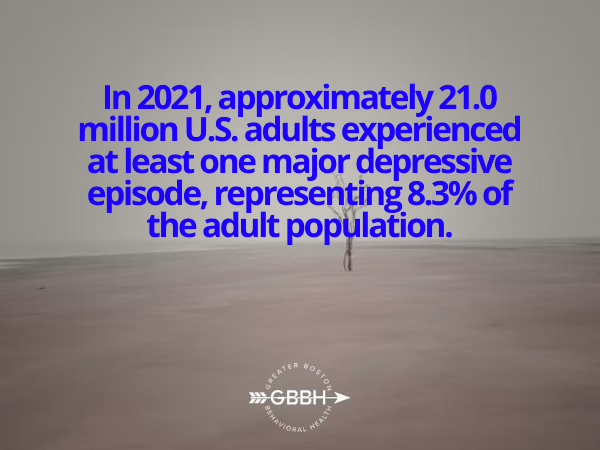Depression is one of the most common mental health conditions, affecting more than 21 million adults in the U.S. each year. It is a serious condition that goes beyond feeling sad or overwhelmed—it can interfere with daily life, relationships, work, and overall well-being. For many, depression is persistent, draining, and deeply challenging to manage without professional support.
The good news is that therapy is one of the most effective treatments for depression. Studies show that psychotherapy—alone or in combination with medication—can significantly reduce symptoms and improve overall quality of life.
At Greater Boston Behavioral Health, we specialize in comprehensive depression treatment programs, providing structured therapy services such as CBT Therapy, DBT Therapy, Intensive Outpatient Programs (IOP), and Residential Treatment Programs. Whether through individual therapy, group therapy, or holistic interventions, the right therapeutic approach can help individuals regain control over their emotions and find lasting relief from depression.
In this in-depth guide, we’ll explore the critical role of therapy in depression treatment, the most effective therapy approaches, and how to find the right treatment program for your needs.
Why Therapy is Essential for Depression Treatment
Depression is not simply a passing mood—it is a serious mental health disorder that affects a person’s thoughts, emotions, and behaviors. If left untreated, depression can lead to severe emotional distress, chronic health issues, and even suicidal thoughts.
Therapy plays a critical role in depression recovery because it:
- Identifies Root Causes – Helps individuals understand the underlying emotional, psychological, or environmental triggers for their depression.
- Teaches Coping Skills – Provides tools to manage stress, regulate emotions, and build resilience.
- Challenges Negative Thought Patterns – Helps individuals recognize and change self-defeating thoughts that contribute to depressive symptoms.
- Provides Emotional Support – Creates a safe, judgment-free space for individuals to express feelings and receive professional guidance.
- Reduces the Risk of Relapse – Helps individuals develop long-term strategies to maintain mental stability.
For individuals experiencing mild to severe depression, therapy can be life-changing. At Greater Boston Behavioral Health, we offer various Mental Health Therapy Programs tailored to meet each individual’s needs.
Types of Therapy for Depression Treatment
1. Cognitive Behavioral Therapy (CBT Therapy)
CBT Therapy is one of the most widely used and research-backed treatments for depression. It is based on the principle that negative thoughts influence emotions and behaviors.
How CBT Helps with Depression:
- Identifies negative thought patterns that worsen depression.
- Teaches individuals how to reframe self-defeating beliefs into positive, realistic thoughts.
- Provides tools for developing healthier coping mechanisms.
- Encourages behavioral activation, which helps individuals re-engage in activities they once enjoyed.
Example:
A person struggling with depression may often think, “I’m worthless and will never succeed.” Through CBT, they learn to challenge this belief and replace it with a more balanced thought, such as, “I have strengths, and I can work toward my goals one step at a time.”
At Greater Boston Behavioral Health, we incorporate CBT Therapy into our Intensive Outpatient Program (IOP), Partial Hospitalization Program (PHP), and residential treatment settings.
2. Dialectical Behavior Therapy (DBT Therapy)
Originally developed for Borderline Personality Disorder, DBT Therapy is now widely used to treat chronic depression, emotional dysregulation, and self-destructive behaviors.
How DBT Helps with Depression:
- Focuses on mindfulness, helping individuals stay present and reduce rumination.
- Teaches distress tolerance techniques for handling intense emotions.
- Develops emotional regulation skills to prevent impulsive reactions.
- Improves interpersonal effectiveness, helping individuals build healthy relationships.
Example:
A person struggling with self-harm urges may use DBT distress tolerance skills, such as deep breathing, ice-cold water therapy, or journaling, to cope with emotional pain instead of engaging in harmful behaviors.
DBT Therapy is a core part of our Mental Health Treatment Programs at Greater Boston Behavioral Health, particularly in our IOP and PHP programs.
3. Psychodynamic Therapy
Unlike CBT and DBT, which focus on immediate coping skills, psychodynamic therapy explores deep-rooted emotional conflicts that may be contributing to depression.
How Psychodynamic Therapy Helps with Depression:
- Examines past experiences, relationships, and unresolved emotional pain.
- Uncovers subconscious thought patterns that may be worsening depression.
- Helps individuals develop self-awareness and insight into their behaviors.
This therapy is often used for long-term depression treatment and is available in individual counseling and residential treatment settings.
4. Group Therapy for Depression
Group therapy provides peer support, emotional validation, and shared healing experiences.
Types of Group Therapy for Depression:
- CBT-based group therapy – Focuses on challenging negative thoughts and behaviors.
- Support groups – Provides a safe space for individuals to share experiences.
- DBT skills groups – Helps individuals learn mindfulness, distress tolerance, and emotional regulation techniques.
Many individuals find that group therapy reduces feelings of isolation and enhances motivation for recovery.
Choosing the Right Depression Treatment Program
1. Outpatient Therapy for Mild to Moderate Depression
- Weekly individual or group therapy sessions.
- Ideal for individuals who are functional in daily life but need emotional support.
2. Intensive Outpatient Program (IOP) for Moderate to Severe Depression
- Structured treatment with multiple therapy sessions per week.
- Includes CBT, DBT, and holistic approaches.
- Best for individuals who need more support but can still live at home.
3. Partial Hospitalization Program (PHP) for Severe Depression
- Day treatment program with structured therapy.
- Helps individuals stabilize before transitioning to outpatient care.
- Includes medication management, behavioral therapy, and emotional support.
4. Residential Treatment Program for Severe, Persistent Depression
- 24/7 supervised care in a structured, therapeutic setting.
- Combines therapy, medical care, and holistic wellness practices.
- Best for individuals who need long-term, immersive depression treatment.
At Greater Boston Behavioral Health, we offer personalized depression treatment plans to match each individual with the right level of care.
Why Choose Greater Boston Behavioral Health?
Our Mental Health Treatment Center in Boston offers comprehensive depression treatment services, providing evidence-based therapies that lead to long-term recovery.
What We Offer:
✔ Customized treatment plans tailored to individual needs.
✔ Expert clinicians specializing in CBT Therapy, DBT Therapy, and group therapy.
✔ Intensive outpatient and residential treatment options.
✔ Supportive, healing environment for lasting mental wellness.
Conclusion
Depression is treatable, and therapy is one of the most effective ways to regain control and improve your quality of life. If you or a loved one is struggling, don’t wait to seek professional support.
Call Greater Boston Behavioral Health at (888)278-0716 to learn more about our Mental Health Therapy Programs and find the right depression treatment option for you. Take the first step toward healing, resilience, and emotional balance today.
FAQ on Role of Therapy in Treating Depression
How does therapy help with depression?
Therapy helps individuals with depression by identifying negative thought patterns, teaching coping strategies, improving emotional regulation, and providing a safe space for self-expression. It also helps uncover underlying emotional and psychological issues that may contribute to depression.
What is the most effective type of therapy for depression?
The most effective therapies for depression include:
- Cognitive Behavioral Therapy (CBT) – Helps individuals reframe negative thoughts.
- Dialectical Behavior Therapy (DBT) – Focuses on emotional regulation and mindfulness.
- Psychodynamic Therapy – Explores past emotional conflicts and unconscious influences.
- Group Therapy – Provides peer support and shared experiences for motivation.
When should someone seek therapy for depression?
If depression interferes with daily life, relationships, work, or personal well-being, seeking therapy is recommended. Common signs include persistent sadness, hopelessness, lack of motivation, isolation, and difficulty managing emotions.
What treatment programs are available for depression at Greater Boston Behavioral Health?
We offer a range of Mental Health Therapy Programs, including:
- Outpatient therapy for mild-to-moderate depression
- Intensive Outpatient Program (IOP) for structured weekly support
- Partial Hospitalization Program (PHP) for more intensive care
- Residential Treatment Program for long-term recovery and immersive therapy
How do I choose the right depression treatment program?
The best program depends on the severity of symptoms, daily responsibilities, and personal recovery goals. A mental health professional can help determine whether outpatient therapy, IOP, PHP, or residential treatment is the best option.
Is therapy alone enough to treat depression, or do I need medication?
Many individuals find relief through therapy alone, while others benefit from a combination of therapy and medication. A mental health professional can help assess whether medication is necessary based on individual needs.


